- Home
- Process Worldview
- Community
- Art and Music
- Whitehead and Process Thinking
- Podcasts
- Spirituality
- Ecological Civilization
- Education
- Contact
- Social Justice
- Science
- Animals
- Sacred Poems
- Whitehead Videos
- Index of All Titles
- Practicing Process Thought
- Process Spirituality: A Spiritual Alphabet
- Recent Posts
Elegy for my Mother’s Mind
by Laura Van Prooyen
appears at Prairie Schooner
When I steady your step on the stairs, you ask not once but twice
where we’re going--to the car, to the store, Mom, remember?
You laugh and say you thought we’d be walking and we are,
right into the part of your brain where you’ll lose me, lose
the child who picked all 43 tulips you waited a solid Chicago winter
to watch bloom. Lose the girl who pedaled her Schwinn
up and back the U-shaped driveway while you fried bacon
behind the evergreens in an electric pan so the house wouldn’t smell.
Continue reading online…
"Elegy for My Mother's Mind"
a process midrash
My mother's mind is becoming like snow. She can't remember what happened two minutes ago or two days ago. It's possible that, in the future, she will not even remember me.
This loss is something I lament and resist. It makes me angry. I would give anything if I could reverse time. Nevertheless, my mother can still play the piano and sing old hymns. Buried within her are some deep memories that have not been covered by the snow. She likes Great Balls of Fire and Old Rugged Cross. And she can smile at me and hold my hand. Sometimes, she even laughs. She is calmer than she was many years ago and has developed a sense of humor that I don't remember her having in the early years.
There are some blessings. She has forgotten so many things, the happy memories but also the sad ones. I'm glad she's forgotten the sad ones. I'm relieved she has forgotten the times when she was so depressed, and we couldn't pull her out of it. In some ways I'm happy that she lives in a now.
I would like to write an elegy for the mind she is losing and also, with God's grace, an ode to the self she is becoming. There is an organization called Reimagining Dementia that is helping me writing the ode. It consists of hundreds of people around the world who are helping caregivers reimagine dementia without succumbing to negative stereotypes and with a recognition that, in fact, people living with dementia have their own gifts and creativity, made possible by living in the present.
However, it's also important to be honest about the loss and the anger I feel as her old self slips away. I'm not sure who the loss hurts most: me or her. I think it's me. I'm not sure she misses her old self as much as I miss it. Regardless, I need to be honest about the loss. When I touch her hands these days, they tremble. Sometimes, we have nothing to say except to be together, holding hands. My relationship with her now is more intimate, more bodily, and less verbal. The love is in the touch. That's good, but I miss the talking.
Laura Van Prooyen has written the elegy I need. It is, to my mind, very "process" in spirit. Process theology teaches that we need to be honest about both sides of life: the pain of loss and the appreciation of a new day. It says that the healing spirit of God is in the honesty as well as the appreciation. In some mysterious way, the poem gives me both. It is an elegy, yes, but also an ode. Process theologians say that every person's life is a journey, that the memories of the past, even as forgotten, are retained in the ongoing life of God and that that the new selves we become are received by God, into God's own life, with a tender care that nothing be lost.
I find comfort in this idea as I lament the loss of my mother's old mind. I'm doing my best to welcome her new mind. Truth be told, she is creating a new mind in me. I'm changing through her. Maybe I'm becoming a better person. If so, her new self, including even the forgetting, is a kind of grace. But it's a grace that can only be recognized alongside the elegy. The Psalmists knew this. They praised God only amid, not apart from, the pain. I think we are in the same situation. The love I give her these days is my ode, and the love she returns, with her trembling hands, completes it.
- Jay McDaniel
Discussion of
Elegy for My Mother's Mind
with the poet
"In this episode, our guest Laura Van Prooyen reads "Elegy for My Mother's Mind," a poem that navigates the complexities of memory, loss, and familial relationships. Laura's poem gives us an opportunity to think about the deep sources of poetic inspiration, the revision process, and the power of metaphor. To learn more about Laura's work, check her website. Click here to see the version of the poem that appeared in Prairie Schooner."


